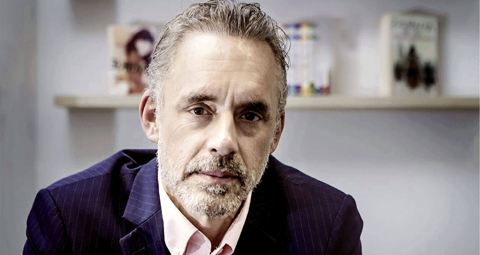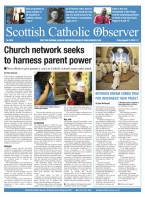December 27 | ![]() 0 COMMENTS
0 COMMENTS ![]() print
print

Jordan Peterson on Scotland’s pro-life bans, becoming a global hate figure, and the Bible’s importance to society
In the first of a two-part series, Richard Purden speaks to the academic who caught the interest of the Catholic world in 2018, and gets his opinion on Scottish issues and the truth of the Bible
The New York Times described acclaimed psychologist Jordan B Peterson as ‘the most influential public intellectual in the western world right now.’ Bishop Robert Barron, the US evangelising sensation, described him as someone who could mentor young people and tell them to ‘stand up straight and act like heroes.’
During a highly successful European tour he appeared in Glasgow and Edinburgh on the back of the No1 international bestseller 12 Rules For Life: An Antidote to Chaos.
Backstage at Edinburgh’s Playhouse Theatre he sat down to discuss a number of issues affecting Catholics today. From the banning of pro-life groups accessing funds at Scottish universities to concerns about changes in the school curriculum regarding LGBT history, many voices suggest that a wider debate is necessary.
“The problem with standing for something, say the utility of a traditional intact heterosexual family, is that it is easy for people to read that as standing against something else,” Dr Peterson said.
“It is in fact very difficult to have an ideal without having a judgement. So many people, who perhaps have nothing better to do now, have made it their business to obliterate anything that smacks of differentiation and consider it discrimination.
“We don’t know in our society how to put something forward as a positive virtue without being accused of being discriminatory, because if you say that one thing is good or better you imply that something else is bad or worse.
“The counter problem is that if you get rid of all the stations between good and better then you have no goals. That’s no solution; it’s a catastrophe.”
TIE concerns
Both secular and Christian parents have voiced some concerns this year about what will be taught to school children in the future regarding LGBT lessons, following the implementation of the successful TIE campaign on inclusive education.
The recent actions of the Scottish Government have left some considering why there has been little or no room for an exchange of views before the action was taken.
“I think we are probably near the point where the state should get out of children’s sex education because there is no cultural consent as to what it should be, so I think that should devolve back to the family,” Dr Peterson said.
“Not that it would be a perfect solution but state-mandated sex education hasn’t been perfect either because it’s become so contaminated with ideology.
“I think the schools should just leave it be. If your children are being taught by ideologues then you should pull them out of the classes because there is no excuse for it.
“The idea that in the last five years we’ve discovered what gender really is, is the height of absurdity. I do think that the fundamental consequence is that it’s going to confuse far more kids than it is going to help.”
A ban on pro-life groups at Strathclyde University was dropped recently after those in opposition successfully fought the decision. In France, pro-life groups now face heavy fines and prison for posting their views online. “That’s just beyond belief to me whether you are pro-life or pro-choice,” Dr Peterson said. “If you think the pro-life voice should be silenced there is something seriously wrong with you. I don’t care what you say about the abortion debate, there is something to be said on both sides at minimum so to stifle that debate is part of this totalitarian leftism that I think is reprehensible and dangerous.”
Dr Peterson also criticised the term “White Privilege” calling it “an appalling concept”. Many in Scotland’s Irish Catholic community which formed out famine and poverty understandably find the now popular term a difficult one. “Everyone should have a problem with that term” says Peterson who suggests ‘it’s become very popular with people using it for political purposes but there is no evidence whatsoever that it measures anything that is valid anymore than any other set of opinions does.’
“There are all sorts of things that make people privileged and under privileged, to attribute everything that someone has managed to cobble together in their life to some unfair advantage they garnered because of their race is an absolutely appalling intellectual move in my estimation,” he said.
“It certainly doesn’t take into account all the other multitudinous factors that are relevant to someone’s failure or success, it begs the question that people are disadvantaged or privileged in arbitrary ways in all sorts of manners. It’s irrational in some sense about our position of birth, you accrue whatever set of biological and socio advantages or disadvantages you have and then you are set forth into the world.
“You make the best of the advantages and then if you have any sense you manifest a profound gratitude for them and multiply them to do the best for you, your family and your culture — that’s how you pay for your privilege. To be pilloried, accused and indicted is to make you subject to a kind of crime that, first of all, you didn’t voluntarily commit and second, there is no possible way you could ever pay for it. That is the purpose behind the concept.”
‘Fascist’ accusations
The Canadian psychology professor has become a hate figure for some on the political Left, particularly online, with accusations flung at him of being a ‘fascist.’ How does he manage these kinds of insults?
“If you stand up against the radical left—which puts you in a category that consists of 92 per cent of the population, according to the latest data—then you could hypothetically occupy any position on the political spectrum from moderate left to extreme right.
“It’s very convenient for the radical leftists to pillory you to ‘extreme right,’ and its very convenient for radical leftists so they don’t have to contend with you and can blacken your name.
“I had 200 lectures online which basically constituted everything I had said of substance since 1993 and people were welcome to comb through and find anything that marked me out as radically right wing.
“There isn’t anything. Quite the contrary. I’ve lectured students for decades on the dangers of fascism, at least as much as the dangers of the radical left, so mostly I make that case and let the public decide.”
Career challenges
The 55-year-old gained wider public attention in 2016 with his self-help style YouTube videos. Taking on political correctness has won him allies such as American Catholic academic and social critic Camille Paglia who described Dr Peterson as ‘the most important and influential Canadian thinker since Marshall McLuhan.’
He admits there have been challenges in taking certain arguments into the mainstream which caused a ‘threat’ to his job and his occupations.’
“My university career was definitely threatened and my clinical practice, which would’ve gone by the wayside as the next blow,” he said.
“Also my reputation and to some degree, secondarily, the stability of my family and my own stability [was threatened], because that is a lot of pressure, and that was the potential price.
“My life has changed dramatically as a consequence of all this. It’s not a price but more like a transformation, and there have been a tremendous number of benefits. Right now I am doing quite well. My health seems to have returned although it was not good for a couple of years, which is quite a long time, but it’s much better now.”
2019 tour
Described by some as a ‘rock star psychologist,’ he has spent most of this year touring the globe. Already more dates are being added for 2019.
“This lecture tour is spectacularly successful and that is very gratifying. I really enjoy doing it and the audiences are extremely welcoming.
“I believe the vast majority come because they are trying to sort out their lives, that is what they tell me and it’s working; that is a wonderful thing. It’s a good substitute for my clinical practice—it’s quite the adventure.”
12 Rules For Life often refers to Biblical stories as a way of helping readers move on from debilitating problems and helping them steer towards self-development and personal growth. The author explains why eternal truths have been vital in directing people towards more practical solutions.
“I believe that human cognition is nested inside a story—we think in stories and that is incontrovertible,” he said.
“We tend to see the world as if it is personified; it manifests itself in characters. Our personal and cognitive worldview of our culture is embedded in a narrative—in the Biblical corpus.
“It’s not so much that I think it’s important; it’s more that it sits at the bottom of our culture. There is no way of understanding the culture, our history and who we are in any deep sense without understanding the Biblical stories.
“That does not mean that you have to be a religious believer, although there are many ways of being a religious believer.
“At the bottom of it all are the Biblical stories, on top of that are layers of literature and philosophy, then an offshoot of science and the development of economics, politics, architecture and all of the things that we have managed to create—but right at the base are the Biblical stories.
It turns out that the most important cultural artefact of the last 4,000 years is not a city or Empire—it’s a book. That’s a long time for something to last. It has a power that is not easily dispensed with and if you do dispense with it then something else rushes in to take its place which is usually a very bad version of something similar.”
- 12 Rules For Life: An Antidote to Chaos by Jordan B Peterson is out now
- For part two of our interview with Jordan Peterson, see the January 4 edition of the SCO










